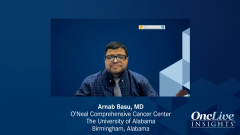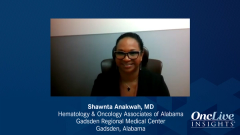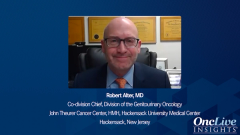
Duration of Treatment with IO-TKI Regimens and Treatment Options at Progression
Drs Anakwah and Basu share their thoughts on the duration of treatment with I/O–TKI regimens and what treatment options are available for patients at progression of renal cell carcinoma.
Episodes in this series

Shawnta Anakwah, MD: Dr Basu, for your patients who achieve a PR [partial remission] on lenvatinib-pembrolizumab, how long do you continue their treatment? Which patients are more likely to achieve a CR [complete response] vs a PR with lenvatinib-pembrolizumab?
Arnab Basu, MD: This is an ongoing question. It revolves around 2 things: how long can patients tolerate lenvatinib at 20 mg a day, and how long can we keep going on immunotherapy after an excellent PR or CR? [So we need to look at] the dose density of the TKI [tyrosine kinase inhibitor] and the duration of the I/O [immuno-oncology]. The answer is dependent on a discussion with the patient regarding balance of quality of life and efficacy. In my practice, I offer to stop immunotherapy after 2 years in the setting of a CR or an excellent PR. With regard to VEGF dosing, rarely in my experience does the VEGF contribute toward getting deep CRs. It’s most likely driven by the I/O component of therapy. I am more lenient in dose reductions for the VEGF TKI toward the 2-year mark if we have great responses.
For the second part of your question, patients are more likely to get a CR. The CLEAR trial was not powered to definitively answer these questions in the subsets. But among the small number of poor-risk patients in that trial, the hazard ratio for survival was excellent. I’ve seen patients with aggressive disease, such as in this case, who tend to respond or benefit from this combination. The trial has a very high rate of CRs as well for an I/O–TKI combination. I generally offer it across on spectrum. I don’t hesitate for poor-risk patients. It’s a well-tolerated regimen. Indeed, from the subgroup analysis from the CLEAR study, it seemed like there was a significant benefit in favor of lenvatinib-pembrolizumab and compared with sunitinib for the least square mean difference. And multiple validated quality-of-life questionnaires like FKSI-DRS [Functional Assessment of Cancer Therapy–Disease Related Symptoms]. It’s a well-tolerated regimen.
Shawnta Anakwah, MD: How do you treat patients who progress on lenvatinib pembrolizumab?
Arnab Basu, MD: This was an area of active investigation. The key unanswered question is the role of a second immunotherapy-based combination regimen. For this reason, I consider clinical trials in this case with doublet therapy. Trials of ipilimumab in a refractory setting have been unremarkable. We’re therefore left with the VEGF inhibitors and mTOR inhibitors. Of these, cabozantinib is likely the most potent, perhaps because of its multikinase targeting. I try to use it in a patient who can tolerate it. If this patient had been on pembrolizumab and axitinib, we could consider lenvatinib and everolimus or cabozantinib. But not in her case. She was already on lenvatinib. In patients who are frail, I consider axitinib given its flexibility in dose titration. A lot of subsequent treatment options are driven by the original regimen. Speaking of which, Dr Anakwah, how do you think the FDA approval of adjuvant pembrolizumab impacts the use of I/O–TKI in your first-line setting and subsequent choices in your practice?
Shawnta Anakwah, MD: That would have a huge impact because it’s going to take off that first-line option of I/O–TKI therapy if they’ve already been exposed to immunotherapy. Then you’re left with what you said, with TKI therapy and mTOR inhibitors, so then you don’t have a lot of great options. That’s going to open up the need for more trials.
Arnab Basu, MD: I agree. There will have to be some examination of the clinical course of the patient on immunotherapy. Did the patient stop immunotherapy after a year? Does recurrence happen 2 years down the line? This will open many questions that we need answers to. Those are great points.
Transcript edited for clarity.








































